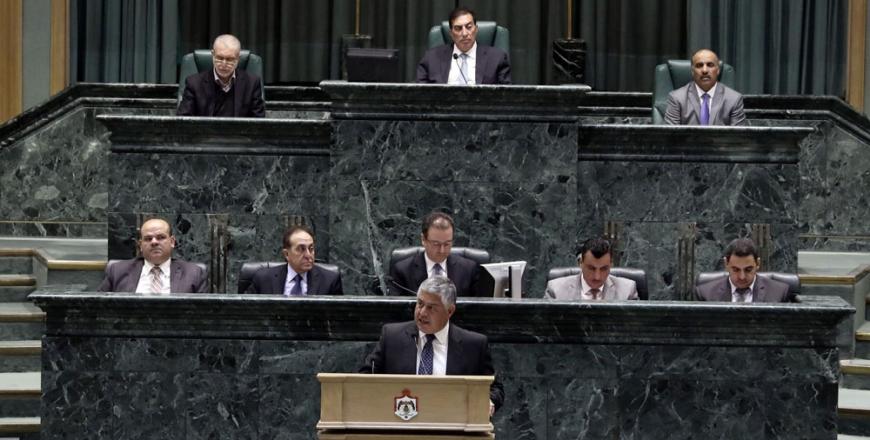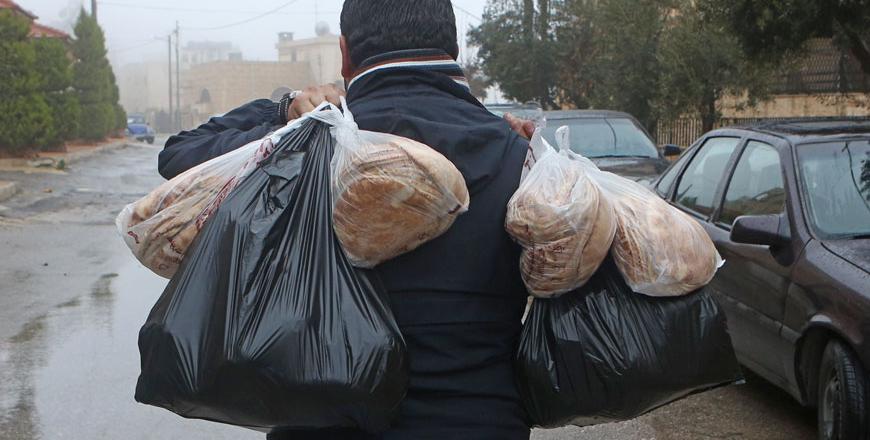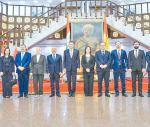You are here
House to start debating budget bill Sunday
By JT - Jan 12,2017 - Last updated at Jan 12,2017
AMMAN — The Lower House is scheduled to start on Sunday the debate over the 2017 draft laws for the state budget and the budgets of independent government units, the Jordan News Agency, Petra, reported Wednesday.
During Wednesday's session, the House decided to allocate 20 minutes to speakers on behalf of House blocs, and 10 minutes for individual deputies.
House Speaker Atef Tarawneh urged the government not to increase taxes on cooking gas, food and medicine, which he described as “red lines not to be crossed”, and also requested the deputies to have their remarks free from demands for their constituencies.
MP Riyad Azzam, the rapporteur of the Lower House's Finance Committee, shared with the Chamber the committee's report on the 2017 draft laws for the state budget and the budgets of independent government units.
In late November 2016, Finance Minister Omar Malhas delivered to the House the state budget draft law speech, in which he outlined the government’s plan to salvage the economy, staggering amidst regional turbulence and a huge refugee crisis.
Both drafts include proposed projects and activities the government intends to implement according to priorities compatible with the Jordan Vision 2025 and the governorate development programme, Malhas said, adding that they were prepared in coordination with local communities to determine their needs and priorities.
In the speech, Malhas said the budget deficit in 2017 is expected to narrow after receiving the foreign grants by around JD270 million, to reach JD827 million, which accounts to 2.8 per cent of the GDP, compared with 4 per cent in 2016, Malhas said, adding that the drop is expected to continue to reach 0.3 per cent in 2018.
Before the grants, the deficit is expected to go down to 5.5 per cent of the GDP, compared with 7.2 per cent in 2016.
As for expectations related to the draft law for the independent government units for 2017, Malhas said that the total revenues for government units is estimated to reach around JD1.666 billion next year, compared with the JD1.710 billion re-estimated in 2016.
The net deficit, before government funding, is expected to reach around JD116 million in 2017, compared with the JD30 million re-estimated in 2016.
On Sunday, Malhas told members of the Lower House Finance Committee, in the presence of Prime Minister Hani Mulki, that the government plans to raise the prices of fuel derivatives by JD0.07 per litre starting from next month.
“In light of the economic situation in the Kingdom, the government has no other choice than to raise the prices of fuel derivatives by seven piasters [per litre], as of next month,” Malhas told lawmakers.
However, at a House oversight session also held on Sunday, Mulki assured MPs that the price of a gas cylinder will remain unchanged at JD7.
The minister noted that the price and tax hikes are part of a plan to collect JD3 billion in the coming years, including JD450 million in 2017, JD520 million next year and JD570 million in 2019.
His Majesty King Abdullah on Tuesday stressed the importance of protecting those with low and middle incomes, especially given the current economic climate.
Meeting with Senate President Faisal Fayez, Tarawneh and members from both Chambers at Al Husseiniya Palace, His Majesty said he had directed the government to reconsider the proposed financial reforms, and to find alternatives that would protect lower earners.
He reiterated the same remarks during a meeting with local community leaders in Ajloun on Wednesday.
He noted that Jordan is going through one of the most difficult stages the Middle East has ever faced, and one that not only affects Jordan, but the entire region.
Members of both Chambers’ permanent offices expressed their faith in Jordan’s ability to overcome adversity, and expressed awareness of the need to work as a team to realise goals that will increase levels of development for all citizens.
Highlights, recommendations of House financial panel report
The following are facts, figures and recommendations from the Lower House’s Financial Committee’s Report on the 2017 draft laws for the state budget and the budgets of independent government units.
•The bills are concerned with the budgets of 55 ministries and public agencies and that of 58 independents government units.
•Some 22 per cent of the population consists of refugees, 80 per cent of whom live below the poverty line.
•The international community is required to help Jordan cover the costs of the Jordan Response Plan to the refugee crisis by writing off a large portion of the public debt, accumulating since 2011.
•GDP growth is expected to reach 2.4 per cent at the end of 2016 because of the economic recession.
•Inflation in the first 11 months of 2016 registered a negative result of -0.9 per cent, compared to the same period in 2015.
•Inflation is expected to be affected by the rising prices of some commodities, reaching 0.8 per cent at the end of 2016.
•Unemployment rate increased up to 15.1 per cent during the first 10 months of 2016, and is expected to have reached 15.9 per cent at the end of 2016.
•The Central Bank of Jordan’s foreign reserves reached JD12.062 billion at the end of October 2016; they are enough to cover the Kingdom’s imports for 6.7 months.
•Total bank deposits increased by 0.8 per cent in the first 10 months of 2016 compared to 2015, reaching a total of JD32.9 billion.
•Trade balance deficit dropped by 9.7 per cent to reach JD6.792 billion during the first 10 months of 2016, compared with the same period in 2015.
•Total national exports decreased by 4.1 per cent to reach JD4.464 billion last year, compared to 2015.
•Jordanian expatriates’ remittances dropped during October 2016 by 1.3 per cent, reaching JD226 million, compared with October 2015.
•Direct foreign investment in the Kingdom stood at JD533.4 million in the first half of 2016, compared with JD449.3 million in the same period of 2015.
•Income tax revenues are estimated for the entirety of 2016 at JD1.046 billion.
•The companies sector contributed 78 per cent of the income tax revenues during 2016.
•Total estimated revenues from the sales tax on commodities and services stood at JD3.195 billion, recording a 9 per cent growth.
•The economic correction measures the government has decided to take will affect low- and medium-income segments of the society and will contribute to further economic slowdown.
•The estimated revenues from these measures, JD450 million this year, are expected to lead to a drop in public revenues under the new procedures.
•Royal Jordanian (RJ) Airline’s estimated revenues stood at JD285.3 million, marking a drop of 24.4 per cent that equals JD93.1 million, after re-estimating the revenues of 2016. RJ revenues constituted 13.3 per cent of the total non-tax revenues.
•The total estimated value of miscellaneous non-tax revenues stood at JD825 million, with a growth rate of 22.6 per cent.
•Public expenditure amounted to JD8.946 billion in 2016, up by JD621 million that correspond to a growth rate of 6.9 per cent. Current expenditure constituted 85.3 per cent, while the capital expenditure stood at 14.7 per cent.
•The number of government units that are expected to achieve financial surplus in 2017 stands at 21 units, compared to 20 in 2016.
•Preliminary data of the public debt until the end of 2016 showed an increase to JD26.1 billion, which equals 94.9 per cent of the GDP.
Related Articles
AMMAN — The Lower House on Wednesday listened to the state budget draft law speech delivered by Finance Minister Omar Malhas, the Jordan New
AMMAN – The government on Sunday submitted to the Lower House the draft 2016 general budget law in addition to the bill governing the budget
AMMAN — State agencies concerned with ensuring a smooth public life during the expected snowstorm have said that this year’s plans include n


















